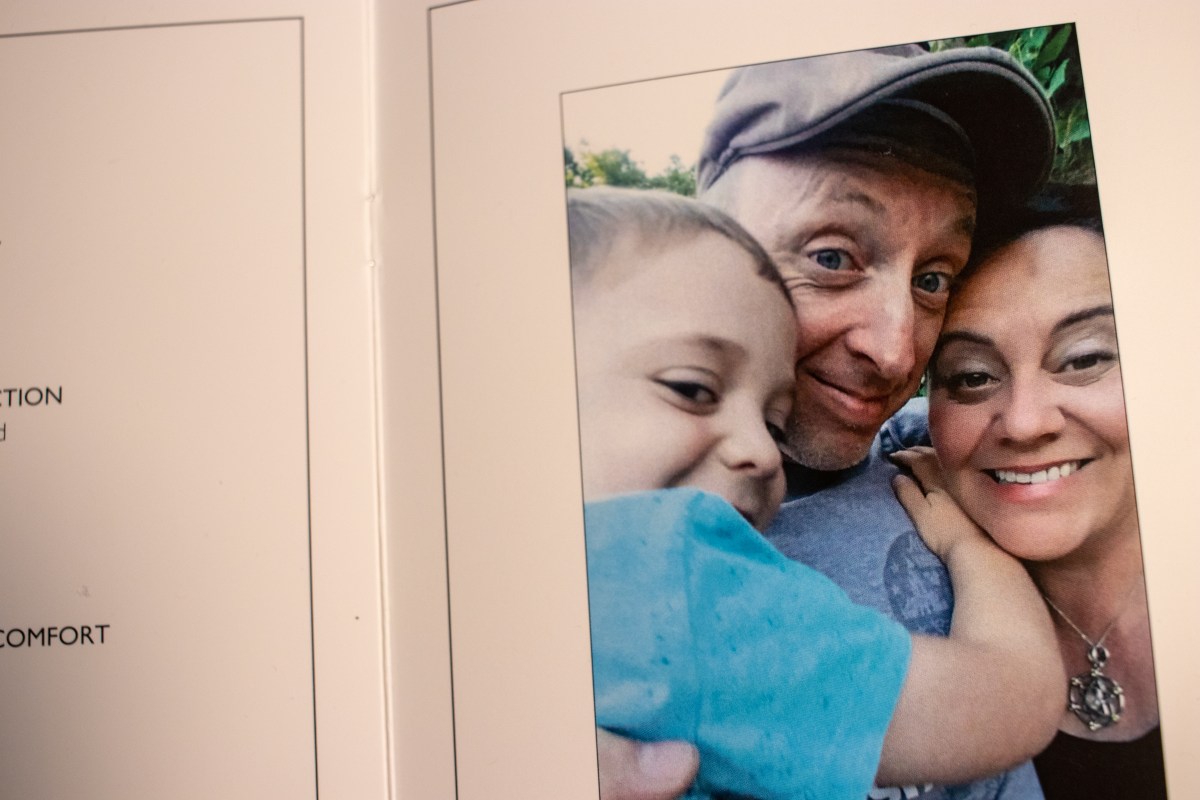By Alexander Hodgkins-Jones

It sits by the stairs of Karen Giltrap-Barnes’ home – a small wooden box, maybe two-by-four-foot, full of mementos and keepsakes.
Her six-year-old son, Braden, goes over to it and lifts the lid, not fully aware of what the box symbolises.
This is a memory box representing a life well-lived, but one taken too soon.
A life, and a father, Braden will grow up knowing only through its assorted contents.
Karen did not want her unwell husband, Jamie Giltrap, to fly 300 miles from their home in Nuneaton to Edinburgh for work.
He chalked his symptoms up to man-flu. “I’ll be alright,” he told her before leaving.
He gave a loving goodbye to Braden, then drove to Birmingham Airport.
Three days later, on January 31, 2018, he was dead.
The man-flu Jamie had complained about on the Sunday of his flight had been the initial signs of something far more serious. Sepsis.
Karen doesn’t blame Jamie for taking that flight. Nor for downplaying his symptoms when he first went to A&E after landing in Scotland.
His word was his bond and he didn’t want to let down the electricians he was due to teach the following day.
She always admired that about him. “If he ever said he was going to do something, he did it,” says Karen.
He wasn’t the type of bloke to make a fuss either. So he accepted a diagnosis of Australian flu and an antiviral prescription.
Karen believes had he been more honest about how unwell he felt on that first visit to the hospital that he would be alive today.
When they began dating in 2001 Karen was unaware of Jamie’s alter-ego, DJ Tango.
“I knew he liked music, but at the time I did not know who he was,” says Karen.
As Tango, Jamie produced a string of successful jungle tunes in the 1990s. An obituary published by DJ Magazine describes him as ‘a pioneer.’
After training as an electrician, he continued to produce music, but much remains unreleased.
“He did not believe in himself. I’m finding great stuff all the time and asking why? Why? Why is this not out there?
“There’s all this music he thought was not good enough. But it absolutely was.”
Karen believes that, like his father, Gordon Giltrap, a sessions musician who received an MBE for his services to music, Jamie was a genius.
“Jamie had synaesthesia. He could produce music through painting pictures. It’s a shame he never recognised his own talent.”
Karen fondly remembers how in awe Jamie was after the birth of Braden. “He used to say to me ‘I can’t believe we’ve created this human being’.”
Together, Jamie and Braden would go on long walks in the woods, build Lego and go swimming. “He was so loving. They were always doing something. I see so much of Jamie in Braden.”
Jamie felt so sick by Monday that he cancelled his class and told Karen that he would be flying back the next day. It was that serious.
She was relieved. “I just want you home now,” Karen recalls telling him. “But on the Tuesday he said he couldn’t fly and was going back to A&E. Then the messages just stopped. I didn’t even know what hospital he was in.”
At work, she pondered the unbelievable out loud while desperately awaiting an update, “what if Jamie dies?”
A colleague dismissed it as a silly question. “Everything will be fine,” they said.
Jamie was only 46. He was physically fit. Didn’t smoke or drink heavily. Karen remembers teasing him whenever he wouldn’t finish off a glass of wine. “I’m done,” he would say, the red liquid still sloshing around the bottom of the glass, “Get it down ya,” she would retort.
That evening Karen was informed by Jamie’s employers that he was in critical care at the Edinburgh Royal Infirmary. They organised a flight.
“Jamie was unconscious when I arrived. I spoke out to him and there was a response. He knew I was there,” she says.
Jamie did improve slightly, but overnight his organs began to fail as the sepsis ravaged his body.
The following morning Karen realised she needed to phone Braden’s school, but the myriad of machines which boxed them both in meant there was no signal in the room.
She told him she would be gone for a minute and tore herself away, “I said, ‘Right Jamie I must go out to make this call’ and that was it.”
While she stood in the corridor of the critical care unit, hundreds of miles from home, a nurse approached and told Karen the devastating news. Jamie had passed away.
She could go back in if she wanted, but Karen chose to stay in the corridor.
“I had been with Jamie for hours. He didn’t want me in that room. He had waited for me to leave. He decided that was the time to go.
“I’m not angry. The NHS is overrun and the window for sepsis is so small. But, had he got antibiotics first he would still be here.”

Karen still has boxes to deal with. Jamie’s boxes of vinyl still stacked up in the loft. The boxed-up emotions of a son who hasn’t cried since the death of his father.
And the old wooden box of mementos sat by the stairs.








